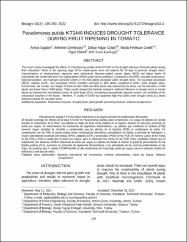Pseudomonas putida KT2440 induces drought tolerance during fruit ripening in tomato

View/
Access
info:eu-repo/semantics/openAccessDate
2022Author
Sağlam, AykutDemiralay, Mehmet
Çolak, Dilşat Nigar
Pehlivan Gedik, Necla
Başok, Oğuz
Kadıoğlu, Asım
Metadata
Show full item recordCitation
Saglam, A., Demiralay, M., Nigar Colak, D., Pehlivan Gedik, N., Basok, O., & Kadioglu, A. (2022). Pseudomonas putida KT2440 induces drought tolerance during fruit ripening in tomato. Bioagro, 34(2), 139-150. https://doi.org/10.51372/bioagro342.4Abstract
The current study investigated the effects of Pseudomonas putida strain KT2440 on the drought tolerance of tomato plants during fruit maturation. Plants at the ripening stage of the mature-green were not watered for 20 days to promote drought stress. Concentrations of photosynthetic pigments were determined. Bacteria-soaked tomato plants (BSS) had higher levels of chlorophyll and carotenoids than non-soaked plants (DWS) under stress conditions. Compared to the DWS, stomatal conductance, lipid peroxidation, and hydrogen peroxide content in the BSS plants decreased under drought stress. The ascorbate peroxidase (APX), catalase (CAT), and peroxidase (POD) activities increased in BSS plants compared to DWS under drought stress. Furthermore, the number and weight of fruits in both DWS and BSS plants was reduced by the stress, but the reduction in BSS plants was lower than in DWS plants. These results showed that bacteria treatment conferred tolerance to drought stress in tomato plants by reducing the peroxidation extent of polar lipids (PLs), increasing photosynthetic pigment content, and activities of the antioxidant enzymes in the leaves. Therefore, P. putida KT2440 has supported high fruit yield under drought stress as a biotic tolerance elicitor for this plant stress.

















